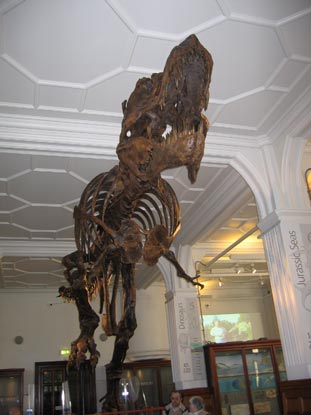Oil Company Asks for Help with Fossil Preservation
Company Appeals Fossil Rules
The construction company responsible for building a crude oil pipeline that is snaking its way across South Dakota, as asked for the burden of preserving any fossils they find to be taken from their shoulders They have asked palaeontologists to assist them with fossil presevation..
South Dakota (United States), is a very important location, especially for Late Cretaceous dinosaur fossils. However, the oil company, Trans-Canada is asking the Public Utilities Commission to make changes to the current rules which place the onus on the construction company to preserve any fossils that they discover whilst in the process of building the pipeline.
Trans-Canada
Trans-Canada, the construction company, is asking the Public Utilities Commission to make changes and rule that any fossils found during the excavation will be the responsibility of the landowner not the construction firm. The change is requested as Trans-Canada prepares for construction of the Keystone XL Pipeline due to start next year. The Public Utilities Commission will review the situation and probably rule on the proposal Tuesday (4th May).
Dakota Rural Action and the Black Hills Institute of Geological Research in Hill City (South Dakota); are against the proposed change claiming it could create unreasonable financial hardships on landowners, and the Public Utilities Commission Chairman Dusty Johnson said the burden of proof is on Trans-Canada to show the changes are warranted and needed.
Chairman Johnson stated:
“The commission made a unanimous decision, and they are asking the commission to change portions of that. They have to prove to the commission that what they want is feasible.”
Keystone XL is the second crude oil pipeline that Trans-Canada plans to run across South Dakota. The original Keystone runs the length of eastern South Dakota from North Dakota to Nebraska on its way to serving refineries and oil storage facilities in Illinois and Oklahoma with half a million barrels of crude oil daily from Alberta (Canada). It is expected to be completed this year.
Keystone XL would enter South Dakota at Harding County and run diagonally across the state, exiting into Nebraska through south-central South Dakota. The pipeline will be able to convey as many as nine hundred thousand barrels daily when it’s operational.
Fossil Preservation
The original Keystone pipeline crosses mostly glacial soil and does not disturb fossil beds, said Peter Larson of the Black Hills group. Keystone XL, however, goes through parts of Harding County that have rich fossil resources from 66 million years ago (Maastrichtian faunal stage of the Cretaceous).
Peter Larson, one of the owners of the Black Hills Institute commented:
“Our major concern is they are trying to put the burden of preserving fossils on landowners, which means the federal and state government and private individuals.”
He went onto add:
“If a dinosaur skeleton is discovered, for example, it could cost a landowner as much as $100,000 to have it excavated and preserved. That responsibility should remain with the company.”
The lawyer representing Dakota Rural Action, Paul Blackburn stated:
“One of our concerns about this is Trans-Canada is trying to take a second bite at the apple, like it didn’t think its first bite was sweet enough.”
He also said a ruling in Trans-Canada’s favour could set a precedent that could affect future projects. Such a ruling could adversely affect the efforts of palaeontologists and field workers as they try to save and preserve rare dinosaur fossils of animals as famous as Tyrannosaurus rex.
A Museum Mount of a T. rex Fossil Skeleton
Picture credit: Everything Dinosaur
Although, we at Everything Dinosaur can appreciate the needs and concerns of the construction company, the strata that the pipeline will be built through is exceptionally important and if fossils are discovered then the priority should be to ensure that valuable scientific material is protected. Let us hope that the need to transport a fossil fuel, does not lead to the loss of important fossils that will help scientists to learn more about the fauna and flora at the very end of the Mesozoic.
Visit Everything Dinosaur’s award-winning website: Everything Dinosaur.


